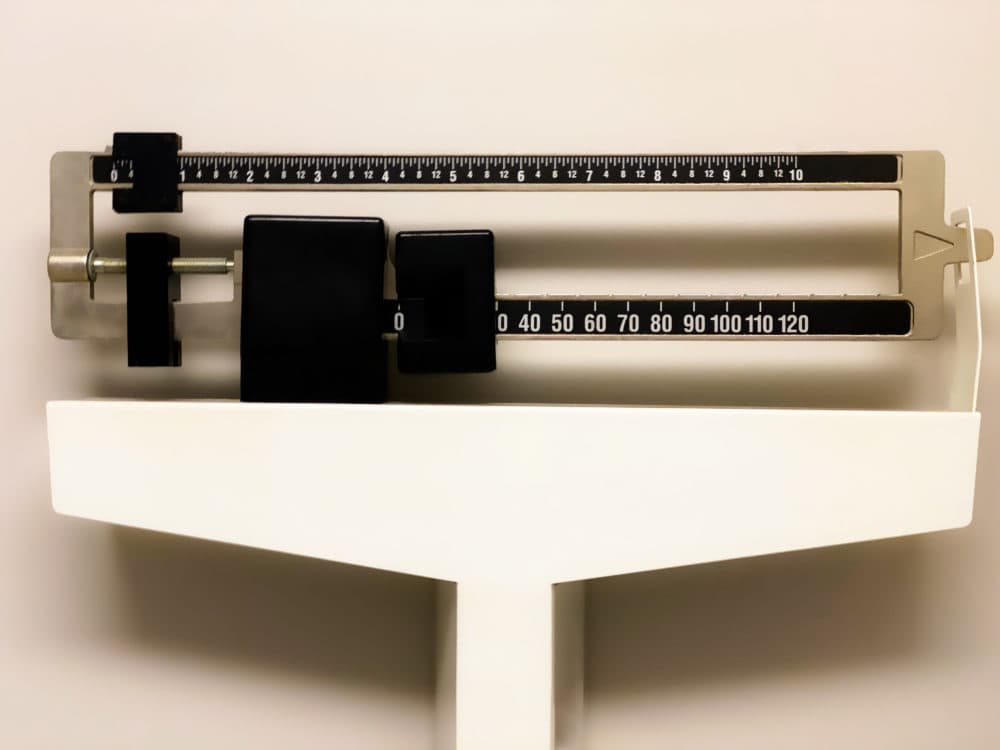Advertisement
Do you need to be weighed every time you see a doctor? Advocates say no
Resume
When you visit a doctor’s office for a routine checkup, one of the first things you’re asked to do is step on the scale.
This may seem like standard operating procedure, but for some people, that routine weigh-in triggers anxiety. And it can serve as a barrier to care. Some plus-sized people say they avoid seeking medical treatment out of fear of being shamed about their weight.
Rachel Estapa knows all too well what that’s like.
Estapa, founder of More to Love Yoga, a Somerville studio that emphasizes body acceptance, has lived in a plus-size body for most of her life. She says she’s often been scolded in medical settings because of her weight.
That shaming began when she was a child.
“When I look back at my medical records … a note taken from a physical was ‘5 pounds over the suggested weight’ — and that’s when they started to put me on diets,” says Estapa. “I was 6 years old.”
Since then, she says, all of her medical appointments have revolved around her weight, regardless of the reason for the visit. Many people with larger bodies say that’s their experience as well. In fact, there’s a hashtag for the phenomenon: #DiagnosisFat; people post about experiences with clinicians who mistreated, misdiagnosed or ignored them, due to assumptions about their weight.
Estapa recalls a moment when she went to a follow-up visit at the gynecologist’s office after the removal of an ovarian tumor. She says the doctor started the conversation by telling her she was overweight and could be a candidate for gastric bypass surgery.
“I stopped and I said, ‘This is no longer a helpful meeting. I’m going to see another doctor,’ and I left the meeting,” says Estapa. “[My weight] is not the whole story; it’s not the whole thing.”
A similar scenario was featured in the Hulu series, "Shrill." The main character, played by Aidy Bryant, goes in for a routine physical and winds up seeing a substitute doctor. The doctor just assumes she wants to lose weight and recommends she undergo gastric bypass. Bryant has said the scene was based on her own experience.
Over the past few years, there’s been a growing push among health professionals, researchers and advocates to address the issue of weight stigma and its harmful effects on health. Multiple studies have found an association between weight discrimination and higher levels of anxiety, depression, eating disorders and stress.
In addition, weight shaming seems to be counterproductive.
“When people experience weight stigma – whether it’s being bullied or shamed or treated unfairly – they have a much higher likelihood of engaging in maladaptive eating behaviors, increasing food intake and avoiding physical activity,” says Rebecca Puhl, deputy director of the Rudd Center for Food Policy and Health at the University of Connecticut. “It also increases physiological stress, things like cortisol levels, which can contribute to weight gain.”
Health care providers typically use a patient's weight and Body Mass Index (BMI) as markers of health. But some experts say that can perpetuate the idea that “healthy” looks a certain way, when in reality, weight is just one piece of the puzzle when it comes to evaluating a patient's health.
As a result, experts argue it may be time to rethink the automatic call to step on the scale.
There are some situations where routine weighing is medically called for. If a patient, for instance, is a growing child or is being treated for an eating disorder, says Dr. Tracy Richmond, director of the Eating Disorders Program at Boston Children’s Hospital.
“The kind of belief that every single patient who walks through the door should be weighed every single time is really outdated,” says Dr. Richmond. “Do patients need a weight when they’re coming in because of a sore throat? Probably not.”
Beyond the negative impact of weigh-ins, research suggests that doctors’ negative attitudes toward people with larger bodies can affect the care they provide. Studies show clinicians typically spend less time with plus-size patients, and often view them as being “non-compliant.”
“We know that people living in larger bodies get diagnosed later for treatable conditions because clinicians are hyperfocused on their weight and not doing all the proper tasks or gathering information about other explanations for what a patient may come in with,” says Dr. Bryn Austin, founding director of the Strategic Training Initiative for the Prevention of Eating Disorders (STRIPED) at the Harvard T.H. Chan School of Public Health and Boston Children’s Hospital. “That is substandard care, full stop.”
In order to improve health care for all, some practitioners are ditching the scale and adopting the use of “weight-inclusive” medical care, which calls for a “Health At Every Size” approach. The idea is to encourage healthy behaviors in people of all sizes, and not make weight the center of every medical visit.
Helena Turner, a nurse practitioner at Fenway Health in Boston, gives her patients a choice as to whether they’d like to be weighed or talk about their weight during their visit.
“I’ll let you know if I have concerns about health indicators, but I’m not going to tell you to lose weight for the sake of losing weight,” says Turner. “Focusing on the chief complaint — the reason a patient is in the office today — is generally my goal.”
Weight-inclusive care isn’t just limited to the scale. It also means having waiting-room chairs and exam tables that are large enough to comfortably fit a plus-size person.
For Rachel Estapa, the yoga instructor, weight-inclusive care begins with establishing a relationship of trust between the patient and clinician.
“That sense of being able to talk about your weight in a way that isn’t something wrong with you … or that it’s a problem to be fixed,” she says. “And that comes down to the skill of the doctor or the practitioner.”
Estapa now looks for health care providers who believe that “healthy” is not solely defined by a number on a scale.
“Weight is not the only indicator of how you’re doing, and it took me a while to build a medical team that respected that.”
This segment aired on December 29, 2021.
